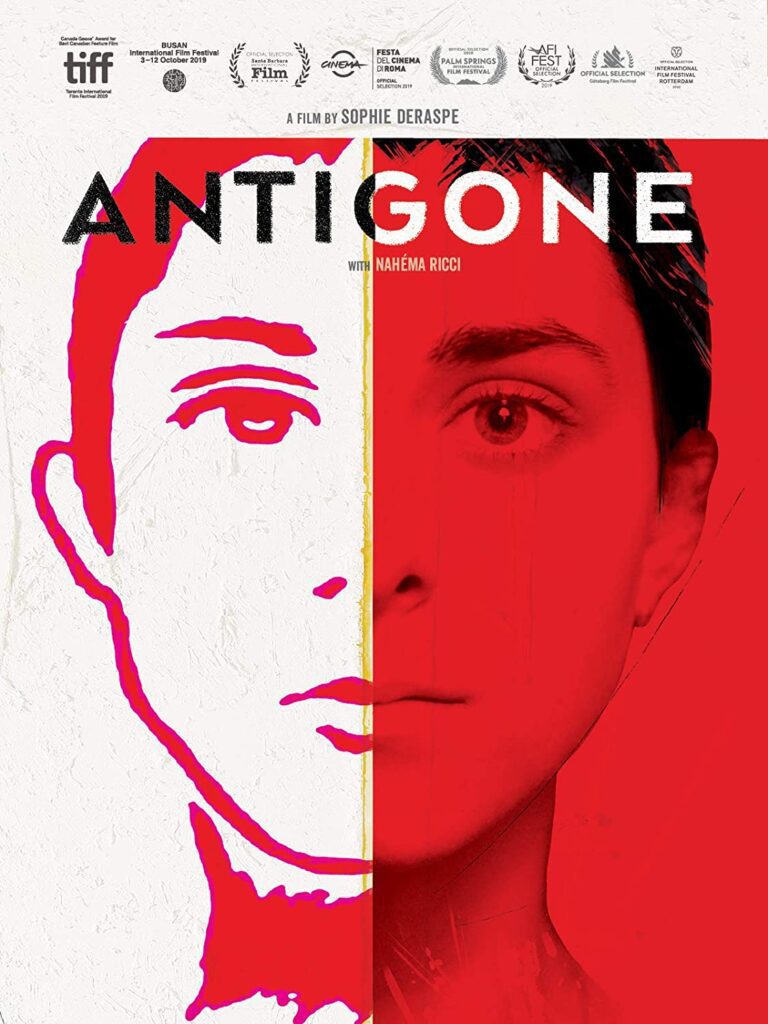
Written by Sai Sagar
Antigone directed by Sophie Deraspe is Canada’s official entry to Best International Feature Film at the 92nd Academy Awards. The film is an adaptation of a Greek tragedy of the same name written by Sophocles in 441BCE. The play is about the Thebes civil war, which leads to the death of Antigone’s brother Polynices, and how she will fight the ruler and the state for the proper burial of her brother. It plays around the complex themes like civil disobedience, natural law vs. law of the state. The film doesn’t adapt the exact plot of the play but its focus mainly is on the theme.
Antigone is about a Kabylian family who fled Algeria because of the civil war and is in Montreal now. The narrative goes back and forth for the first 15 minutes giving us the past, present, and future of this family: Antigone; Eteocles, the elder brother; Polynices, the younger brother; sister Ismene; all living with their grandmother Mene. They are having dinner and are at the merriest joking and laughing about each other. The director’s camera captures them at the intimately best moments and their lives are all about simple joys like eating and dancing together. Hemon, a classmate of Antigone, is very much moved by the immigration story she narrates and they both slowly develop a liking towards each other. One fine day, tragedy hits them as police arrest Polynices. Eteocles tries to stop them and is shot dead. Polynices, who is already a repeated offender, is arrested because he tries to assault a police officer. All the women in the family are left alone, they have no legal connections, no money, and nothing to look forward to. At this time, Antigone comes up with an idea of saving her brother from the clutches of the police and getting deported back to Algeria. How will she deal with this situation and will her struggle find any support is what is followed by in the rest of the narrative.
The detailed discussion of the plot of the source and the details of the plot of the film are necessary to understand the strong social criticism and the message this film is delivers. The lives of the immigrants are so different from the lives of the citizens. They have nothing but their families with them and when the families are taken away from them, they are left with nothing. This is the point where Antigone breaks down and starts going against all odds to keep her family together. When given a choice between being a citizen of a developed country and being with her family, she chooses the latter one. The characters, situations, and plot take something from the source and the development of it takes this whole narrative to the next level, making this one of the decently adapted plays without damaging the soul of it. It also adds something to it by mentioning the problems of the immigrants in the world with rise of fascism. The social commentary is what makes this story relevant to today’s times and I think the other countries that send their films to Oscars should learn a thing or two from this narrative about representation.
This film, even though being a modern narrative, follows the conventions of the ancient Greek tragedy. For instance, the chorus is replaced by a rap video where the people protesting against events are shown, including hate comments they get on social media, morphed pictures with malign intent, news scrolls, and pop elements like graffiti. There are dream sequences, which almost draw parallels to the play and the narrative. There is one such sequence in which a blind woman, dressed in all black, offers Antigone a choice between her citizenship and life with her family that we later realize is a dream. But to interpret in one way, the blind lady can be seen as a human manifestation of the statue of justice. Antigone at the end is left with a tough choice to make, drawing a parallel with an element of the play, law of nature/heart against the law of the man/country.
Actress Nahema Ricci, who plays Antigone, nails her part. She emotes with just her eyes and makes the audience realize her deepest feelings and fears from the beginning. You won’t take your eyes off the screen when you see her. That’s how captivating her performance is. Knowing that the director was on a hunt to cast amateurs and seeing the actress’ performance, one can clearly tell that her endeavors were successful. Behind all the superficiality, the beauty and surreal cinematography, the horror and the evil of police brutality, there is something that the director wants to convey through. The message is pretty direct; it is our indifference to these issues that causes these problems. The story takes its inspiration from a lot of real-life events which occurred back in time and has been growing more in recent times. This intolerance towards immigrants and crushing any form of dissent shows how dangerous these things can be just because the people remain silent. The message is pretty vocal in this film from one of the chorus raps where Antigone’s pictures are painted all over the wall in the most vibrant red color, almost symbolic to a revolution. The thing that stood with me after the end of the film is a wall full of graffiti painted in vibrant colors with the word “Resistance” written on it.